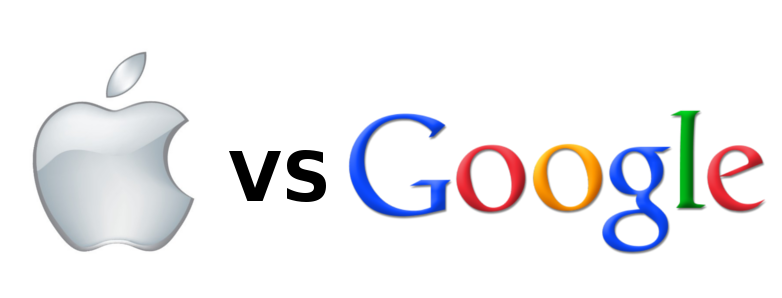Apple VS Google: Rivalry Explained
 In the smartphone world there are really only two major players: Google (creator of Android) and Apple. And no matter what site you read or where you go in the tech world, the rivalry between the two is bitter and the loyalties strong. The age-old debate between Apple and Google (or more specifically, Android) has always been pretty heated and full of fanboys trying to shout over each other that their product is the best and has the best features and out trumps ALL competition, etc, etc. While I most certainly have my own opinion on the debate, such arguments tend to be rather pointless and baseless and it’s impossible to declare a real winner. But the reason why probably isn’t what you think.
In a fantastic article on Re/Code, writer Walt Mossberg makes the argument that Apple and Google aren’t actually competing in the sense that everyone thinks they are. His argument is that the two companies are actually working from entirely different markets and entirely different business models and therefore aren’t even playing the same game. It isn’t something I had ever really considered, but it makes a ton of sense.
While Apple makes their money from actual iPhone sales and simply includes the iOS apps and such as a side, Google doesn’t really sell phones for the bulk of their profit–they make their money from selling user data for advertising, and from the Android apps. When you take that into account, then you’ll see that Samsung is actually Apple’s main competition. Samsung also makes phones and markets to the same kind of people who use iPhones. The difference is that Samsung also caters to the cheaper phone markets with their line of mid-tier products. Samsung, of course, uses Google’s Android OS.
As to which is better: Apple or Android, I think it is impossible to compare them. The two systems are, for the most part, aimed at entirely different people and have complicated histories. Apple has become something of a status symbol and they have embraced and encouraged that marketing strategy. The iPhone was really the first smartphone of its kind, which also carries some prestige. Android, on the other hand, is marketed to be for everyone with a range of customization that isn’t available on any other phone OS. Android smartphones have a history of being a little bumpy, but the options are far more varied than with Apple. All that aside, in the end I expect it really all comes down to your personal preference.
Make sure that you check out the full article on Re/Code, as it makes a lot more arguments than I have outlined and even explains some of the challenges facing both Google and Apple in the coming months. And as always, let me know what you think about the debate in the comments!]]>
In the smartphone world there are really only two major players: Google (creator of Android) and Apple. And no matter what site you read or where you go in the tech world, the rivalry between the two is bitter and the loyalties strong. The age-old debate between Apple and Google (or more specifically, Android) has always been pretty heated and full of fanboys trying to shout over each other that their product is the best and has the best features and out trumps ALL competition, etc, etc. While I most certainly have my own opinion on the debate, such arguments tend to be rather pointless and baseless and it’s impossible to declare a real winner. But the reason why probably isn’t what you think.
In a fantastic article on Re/Code, writer Walt Mossberg makes the argument that Apple and Google aren’t actually competing in the sense that everyone thinks they are. His argument is that the two companies are actually working from entirely different markets and entirely different business models and therefore aren’t even playing the same game. It isn’t something I had ever really considered, but it makes a ton of sense.
While Apple makes their money from actual iPhone sales and simply includes the iOS apps and such as a side, Google doesn’t really sell phones for the bulk of their profit–they make their money from selling user data for advertising, and from the Android apps. When you take that into account, then you’ll see that Samsung is actually Apple’s main competition. Samsung also makes phones and markets to the same kind of people who use iPhones. The difference is that Samsung also caters to the cheaper phone markets with their line of mid-tier products. Samsung, of course, uses Google’s Android OS.
As to which is better: Apple or Android, I think it is impossible to compare them. The two systems are, for the most part, aimed at entirely different people and have complicated histories. Apple has become something of a status symbol and they have embraced and encouraged that marketing strategy. The iPhone was really the first smartphone of its kind, which also carries some prestige. Android, on the other hand, is marketed to be for everyone with a range of customization that isn’t available on any other phone OS. Android smartphones have a history of being a little bumpy, but the options are far more varied than with Apple. All that aside, in the end I expect it really all comes down to your personal preference.
Make sure that you check out the full article on Re/Code, as it makes a lot more arguments than I have outlined and even explains some of the challenges facing both Google and Apple in the coming months. And as always, let me know what you think about the debate in the comments!]]>
